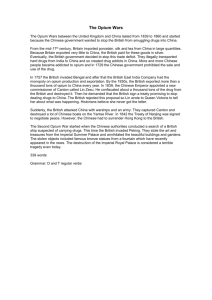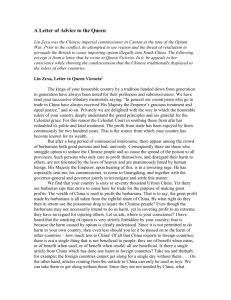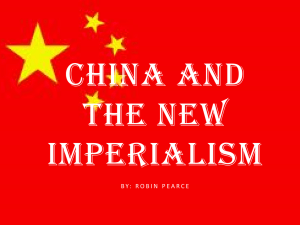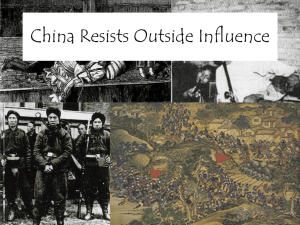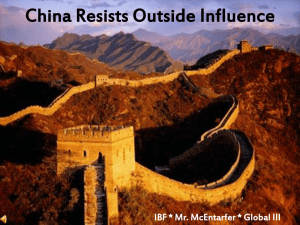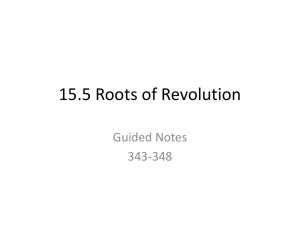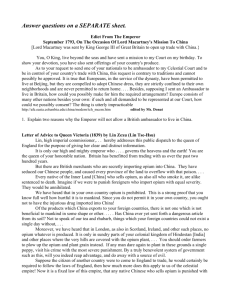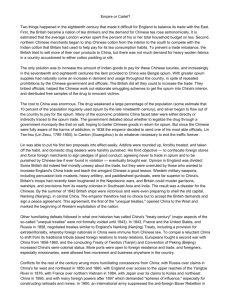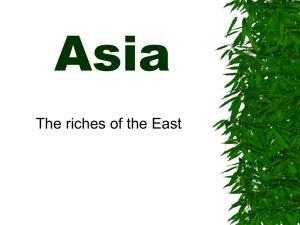File
advertisement
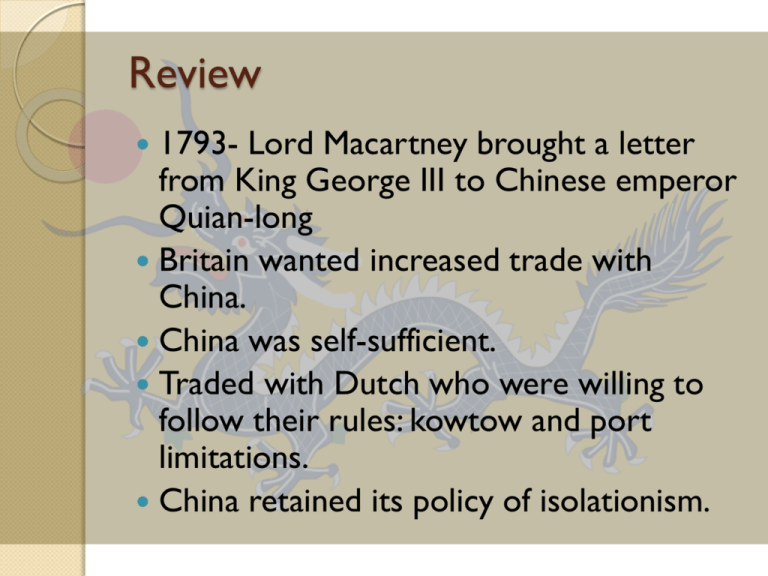
Review 1793- Lord Macartney brought a letter from King George III to Chinese emperor Quian-long Britain wanted increased trade with China. China was self-sufficient. Traded with Dutch who were willing to follow their rules: kowtow and port limitations. China retained its policy of isolationism. China rejected offers of trade because it was largely self-sufficient. Agriculture: rice, maize, sweet potatoes and peanuts Natural resources: salt, tin, silver, and iron Manufacturing: silks, cottons and porcelain You are a local official in 19th-century China. You are proud of your country, which produces everything that its people need. You discourage contact with foreigners. People from the West are eager to trade with China. Most foreign products are inferior to Chinese goods. Britain determines to force trade. The British Answer Opium: habit-forming narcotic made from poppy plant. Not the California Poppy Initially, opium was being used for pain relief. British now smuggled opium in for nonmedical use. By 1835, 12 million Chinese were addicted. 1839, China begged Britain to stop. Pleas were ignored ad the Opium War broke out. China was no match for Britain, and the Treaty of Nanjing was signed in 1842. Two Perspectives Chinese Official British Merchant Free trade- Britain responding to demand of Chinese people. Economy of India and Britain deeply tied to opium trade. British demanded reparations for the insult to British honor and £2 million loss of property in opium chests. Merchants property was being stolen. The merchants are the ones being wronged. Violated property rights. British did not recognize Chinese power over them. Opium is harmful to the Chinese people. British barbarians must stop. Opium prohibited in China by Commissioner Lin Zexu. Blockaded the Canton port, keeping foreign merchants under house arrest until they surrendered their chests of opium for destruction. Opium smugglers were threatened with execution. Merchants cont’d A pamphlet signed by “A British Merchant” argued that the sale of opium was not immoral because “the people of China were only too willing to receive it. Surely, therefore, ‘no morale will be urged against it.’” Chinese people were culturally different and therefore somehow culpable for their addiction. Merchants not culpable as the opium trade was sanctioned by the British government. The government “consulted on every occasion the wants and needs of Chinese consumers.” The Chinese were also growing their own opium. It would be unfair to bar British traders alone from participating in the lucrative business of selling opium, while other opium importers such as the Americans reaped the benefits. “opium was probably less harmful than gin and anyway it was the Chinese who insisted on smoking it...unless one reduced demand, there was no point in trying to strangle only one of several sources of supply.” Why was it on the shoulders of the British to consider “preserving the morals of the Chinese people, who were disposed to buy what other people were disposed to sell them?” “The actions of the Chinese Commissioner had been ‘unjust and no better than robbery’” British merchants were paid in silver by the Chinese. This was then used to buy tea from the Chinese who now only accept trade payment with silver. It would be for the interest of the Chinese Government itself to alter the law of China on this matter, and to legalize, by a regular duty, a trade which they cannot prevent. Can the British merchants use the idea of cultural Darwinism to support their actions? Chinese Officials China is not a barbarian country. It is equal to Britain and should not be looked upon as a country to be ignored. Rules should be respected and followed. It is a case of commercial and imperialist British greed trying to force opium on the Chinese. Opium addiction negatively impacts the work of the Chinese. Too much silver is leaving China to pay for opium The Chinese expected foreign British government officials to keep their merchants in order. Parliament was unwilling to enforce Chinese laws against British citizens on Chinese soil. Officials con’d China was an innocent victim of foreign aggression and exploitation. Such persons who only care to profit themselves, and disregard their harm to others, are not tolerated by the laws of Heaven and are unanimously hated by human beings. By what right do they then in return use the poisonous drug to injure the Chinese people? The wealth of China is used to profit the barbarians. Let us ask, where is your conscience? I have heard that the smoking of opium is very strictly forbidden by your country; that is because the harm caused by opium is clearly understood. Since it is not permitted to do harm to your own country, then even less should you let it be passed on to the harm of other countries—how much less to China! Is there a single article from China which has done any harm to foreign countries? Take tea and rhubarb, for example; the foreign countries cannot get along for a single day without them. The fact is that the wicked barbarians beguile the Chinese people into a death trap. He who sells opium shall receive the death penalty and he who smokes it also the death penalty. In regard to those barbarians who bring opium to China, the penalty is fixed at decapitation or strangulation. Assignment Assigned the position of British merchant or Chinese official. Write a 1 ½ to 2 page persuasive essay, supporting your position for or against the opium trade in China. Practice persuading the opposition of your point orally. Present your position to the class. Do not read your paper. Be prepared enough to be able to truly speak to us.You may use note cards.
